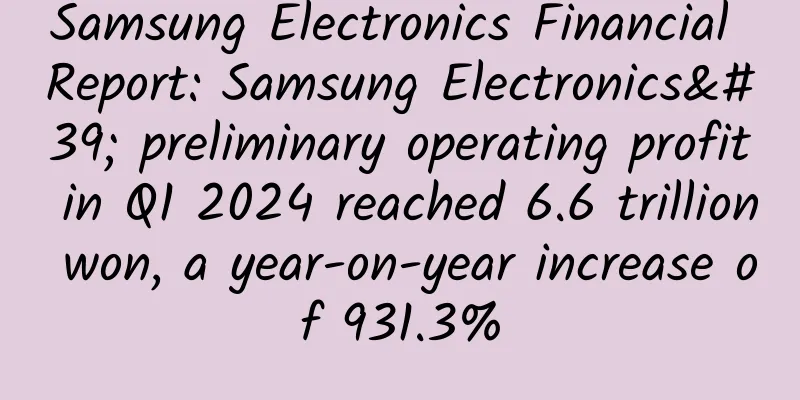Samsung Electronics Financial Report: Samsung Electronics' preliminary operating profit in Q1 2024 reached 6.6 trillion won, a year-on-year increase of 931.3%

|
Samsung Electronics' profit rebounded sharply in the first quarter of 2024, reflecting an improvement in the company's key semiconductor division and strong sales of the Galaxy S24 smartphone. The world's largest memory chip maker reported preliminary operating profit of about 6.6 trillion won ($4.9 billion) on Friday, up 931.3% year-on-year, compared with analysts' expectations of 5.37 trillion won. The growth ended a series of quarterly declines that began in the third quarter of 2022. Revenue for the quarter rose to about 71 trillion won, below expectations of 71.8 trillion won. Tom Kang, director of Counterpoint Research, commented: "Revenue was lower than expected." But he said initial results showed that business had returned to normal. "Reducing chip production is the right move, and Samsung is now benefiting from the artificial intelligence trend in semiconductors and smartphones." Samsung will announce its full results, including breakdowns of each division, on April 30. Rebound after severe downturn The results highlight that demand for memory chips that power modern electronics is beginning to rebound after a severe downturn in the industry. South Korea's chip exports in March rose 35.7% year-on-year to $11.7 billion, the highest monthly total since March 2022. Rising memory chip prices also helped. Major DRAM producers raised prices by an average of 7% to 10% in the first quarter as inventory levels for products such as smartphones and personal computers normalized, said Akshara Bassi, senior analyst at Counterpoint Research. Samsung’s semiconductor business should recover to 2022 levels this year as a prolonged market downturn begins to end, Kyung Kye-hyun, Samsung’s chief executive in charge of semiconductors, said at the company’s annual shareholder meeting on March 20. The company’s average quarterly operating profit that year exceeded 10 trillion won. AI helps Samsung make a comeback Kyung also discussed how Samsung is boosting its advanced packaging business after setting up a dedicated team last year. His optimism is somewhat in line with Nvidia (NVDA.US) co-founder Jensen Huang's recognition of Samsung as a supplier of high-bandwidth memory chips (HBM), a key component of graphics processors for training artificial intelligence systems. HBM is a key component of Samsung's efforts to become the world's leading chipmaker, but it is also part of why Samsung does not have a clear lead over its competitors in the memory chip market. The company said its HBM sales grew by more than 40% in the fourth quarter of last year, and memory chip demand showed signs of recovery. “AI, and in particular the shift toward on-device generative AI, will be a key catalyst for increased demand, leading to continued price increases throughout the rest of the year,” Bassi said. “Samsung is well positioned to capture AI-led deployments with its latest high-capacity HBM products and potential collaboration with Nvidia.” Analysts have been raising their price targets for Samsung to take into account benefits from artificial intelligence and signs of a broader rebound in memory chip demand and prices after a long slump. Fund managers have also begun shifting money to Seoul-listed Samsung to take advantage of its expected rebound. While AI giant Nvidia has tripled in the past 12 months and its main HBM supplier SK Hynix has more than doubled, Samsung's gain is only 32%, and it is expected to have more room to rise in the future. “We have started to reduce our exposure to SK Hynix and allocate to other parts of the memory chip value chain that have not benefited from it, such as Samsung Electronics, where we think the upside has not yet been realized,” said Christine Phillpotts, portfolio manager at Ariel Investments LLC. “We expect some catalysts to emerge for Samsung to the upside.” Separately, Citi analyst Peter Lee published a report this week warning investors of an upcoming “replacement cycle” in which solid-state drives are likely to replace mechanical hard disks for artificial intelligence. Lee said Samsung stands to benefit because SSDs rely on NAND memory. "Our new conclusion is that SSDs will become part of AI," the Citi analyst said, contrary to market consensus, adding that SSDs are "better suited for AI training applications" because they are 40 times faster than mechanical hard drives. Lee is one of the analysts who recently raised his price target for Samsung, which is expected to rise 17% next year, compared with gains of about 12% for SK Hynix and 14% for Nvidia. Zhitong Finance |
<<: Why did Apple use the San Francisco font in iOS 9?
>>: In the era of mobile reading, online literature will break the model of selling by word
Recommend
If we don’t have a lot of money, how can we do marketing promotion efficiently?
Some thoughts before reading: "Half of my ad...
Was global warming first proposed by astronomers?
Author | Zhou Yihao Review | Zheng Chengzhuo Edit...
A good WeChat operation is better than 100 salespeople: In-depth analysis of WeChat operation
Introduction: Every time technology breaks throug...
iPhone 6/6 Plus Chinese version on sale day rush to buy guide
One month after the first batch of iPhones were r...
At the just-concluded Chinajoy, what muscles did BAT flex?
[[144293]] The four-day Chinajoy has officially c...
Apple, which has deep roots in China, will be hit hard by Trump's WeChat ban
Beijing time, August 10 morning news, because Ten...
April 2022 "Science" Rumors List: Drinking Coke will cause a positive antigen test? Dogs also shed tears when they are wronged?
The monthly "science" rumor list is gui...
The process and method of building user portraits
User portrait refers to a labeled user model abst...
Master Novick talks about how to work with parents to make child and adolescent treatment effective - 12 lectures from theory to clinical case analysis
Master Novick talks about how to work with parent...
Master these 12 tips for social monetization
Today I would like to talk to you about how to qu...
Detailed explanation of Glide life cycle management mechanism for advanced Android source code
[[421375]] This article is reprinted from the WeC...
Big Fish Chinese Studies - Three Character Classic Enlightenment Lecture Baidu Cloud Download
Big Fish Chinese Studies - Three Character Classi...
Complete information flow promotion plan for 5 major industries! Take it for reference~~
Nowadays, mobile advertising is experiencing expl...
How to make money from Tik Tok short videos? How to make money by short videos on Tik Tok?
How to make money from Tik Tok short videos? How ...
What does “February 2, the dragon raises its head” mean?
Appointment with the Starry Sky | What does “Febr...



![Bao Juncheng: [ATA Full Literacy] High-end Literature Series (A)](/upload/images/67cc0da6c4ebb.webp)





